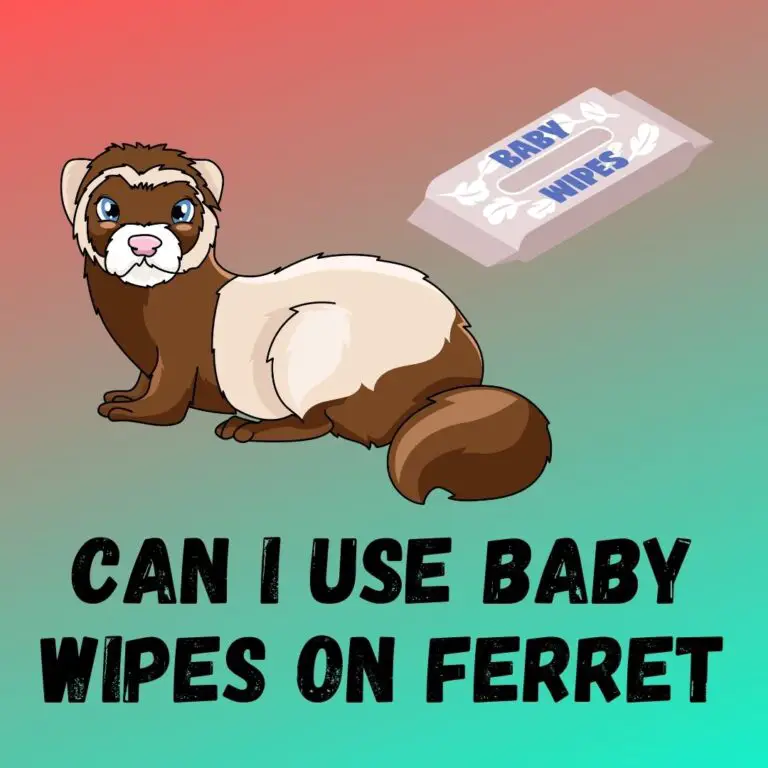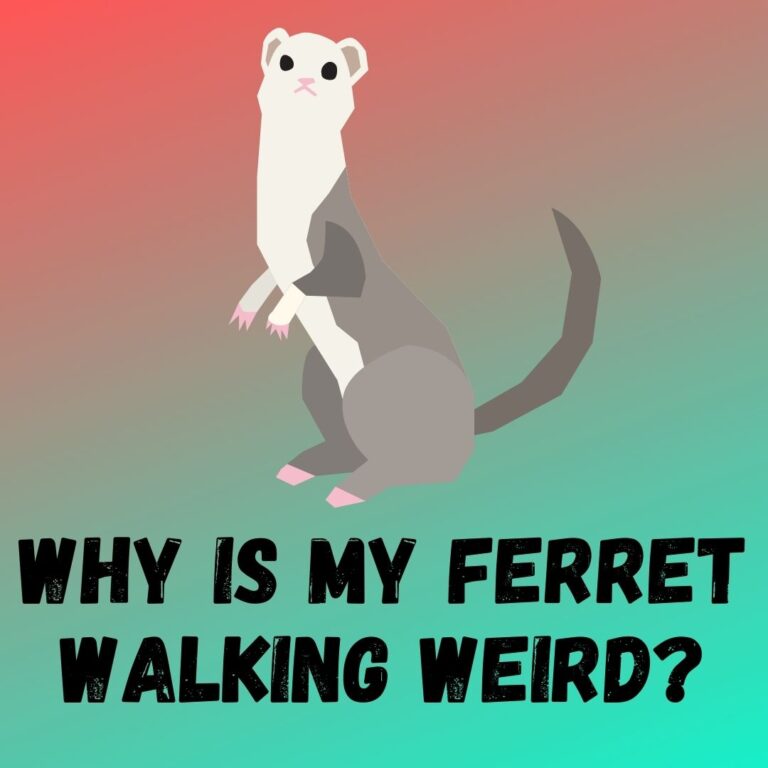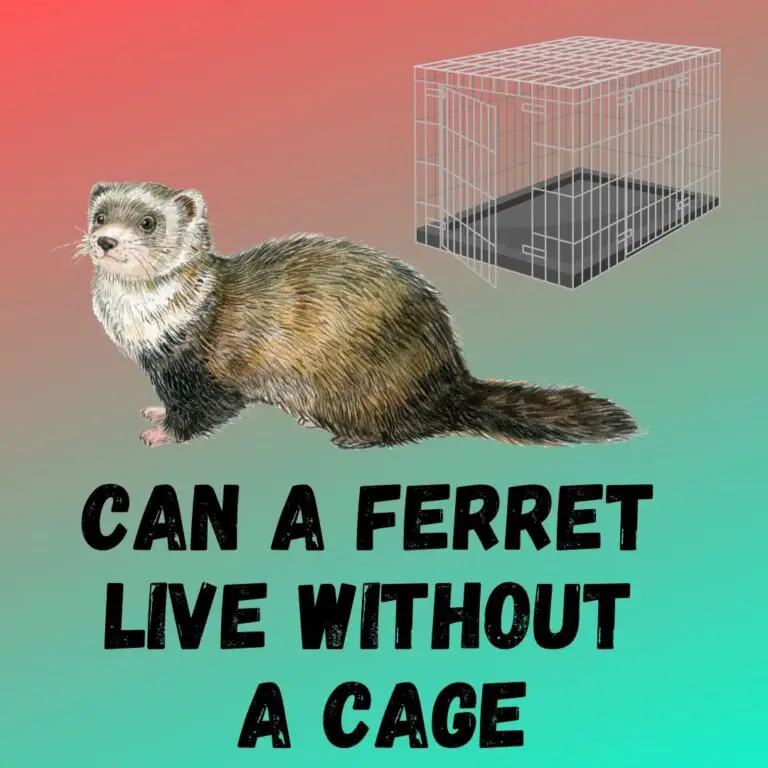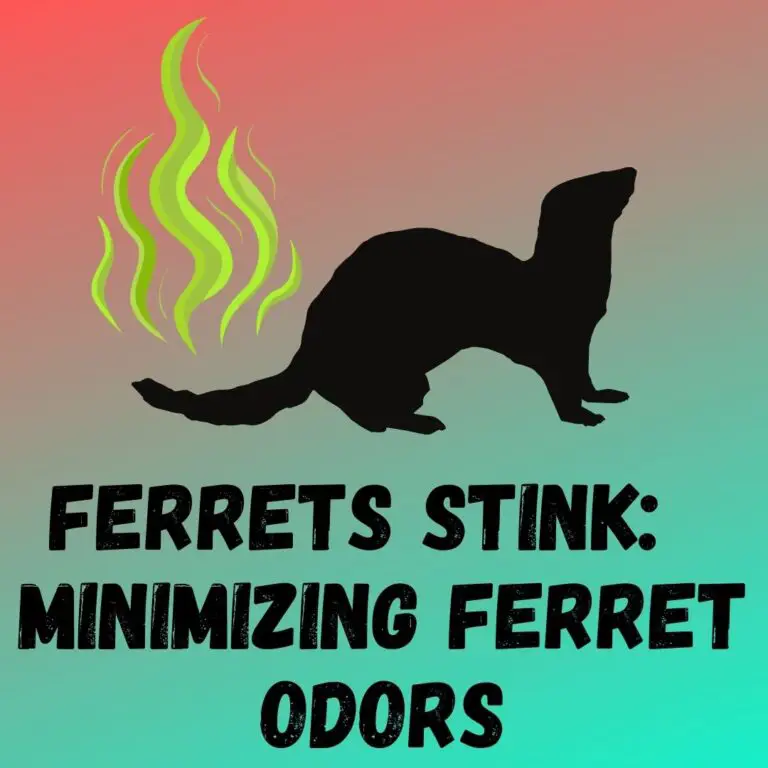
Are you a ferret owner who has noticed your female ferret losing hair on her tail? Don’t panic just yet! As an experienced ferret enthusiast, I’ve encountered this issue before and I’m here to shed some light on the possible causes and solutions. Hair loss in female ferrets can be a common occurrence, but it’s important to understand the underlying reasons and take appropriate action. In this article, I’ll discuss the potential causes of hair loss on a female ferret’s tail and provide you with some helpful tips to address this issue. So, let’s dive in and unravel the mystery behind your furry friend’s hair loss!
Possible Causes of Hair Loss in Female Ferrets
When it comes to understanding why female ferrets may experience hair loss on their tails, it’s important to explore the possible causes. As an expert ferret enthusiast, I’ve observed several factors that can contribute to this common issue. Below, I’ll discuss a few potential reasons for hair loss in female ferrets:
- Hormonal Imbalance: Female ferrets are prone to developing adrenal gland disease, which can lead to hormonal imbalance. This imbalance may result in hair loss, particularly on the tail. If your ferret is experiencing hair loss, it’s crucial to have them evaluated by a veterinarian to rule out this potential cause.
- Stress and Anxiety: Just like humans, ferrets can experience stress and anxiety. Changes in their environment, such as a move to a new home or the presence of new pets, can trigger hair loss in female ferrets. Creating a calm and secure environment for your furry friend can help minimize stress-related hair loss.
- Parasites: Fleas, ticks, and mites can infest a ferret’s fur and cause irritation and hair loss. Regular flea and tick prevention, as well as routine grooming, can help prevent parasite-related hair loss. If you suspect your ferret has parasites, consult with a veterinarian for appropriate treatment.
- Allergies: Allergies can also be a potential cause of hair loss in female ferrets. Environmental allergens, such as certain cleaning products or bedding materials, can irritate their skin and lead to hair loss. Pay attention to any changes in your ferret’s environment and consult with a veterinarian if you suspect allergies to be the cause.
It’s important to note that hair loss in female ferrets can vary in severity and duration. While these are some possible causes, each ferret is unique, and a proper diagnosis by a veterinarian is necessary to determine the underlying reason for hair loss. In the next section, I’ll provide some helpful tips to address hair loss in female ferrets.
Hormonal Imbalance: A Common Culprit
Hair loss in female ferrets can often be attributed to hormonal imbalance. As a seasoned ferret enthusiast, I have come across this issue multiple times and it is a topic that requires attention. Let’s dive further into why hormonal imbalance can be a common culprit for hair loss in female ferrets.
What Causes Hormonal Imbalance in Female Ferrets?
Female ferrets go through a natural reproductive cycle that includes going into heat, during which they release a large amount of estrogen. This estrogen surge can sometimes disrupt the normal hair growth cycle and result in hair loss, particularly on the tail.
The Role of Adrenal Gland Disease
One of the major causes of hormonal imbalance in female ferrets is a condition known as adrenal gland disease. This disease occurs when the adrenal glands in a ferret overproduce certain hormones, including estrogen. As a result, the ferret’s hormone levels become imbalanced, leading to hair loss.
Identifying Hormonal Imbalance in Female Ferrets
Hormonal imbalance can be identified by observing certain symptoms in your female ferret. These may include:
- Hair loss on the tail, especially near the base
- Itching or scratching excessively in the affected area
- Changes in behavior, such as aggression or lethargy
If you notice these signs, it’s crucial to consult a veterinarian to confirm the diagnosis and determine the best course of action.
Treating Hormonal Imbalance and Hair Loss
Treating hormonal imbalance in female ferrets requires a comprehensive approach. Your veterinarian may recommend:
- Surgical intervention to remove the affected adrenal glands
- Medications to regulate hormone levels
- Dietary changes to support healthy hormone production
Remember, it is essential to work closely with a veterinarian who specializes in exotic pets to ensure the correct diagnosis and appropriate treatment for your furry friend.
Skin Infections and Parasites: A Troublesome Scenario
If your female ferret is experiencing hair loss on her tail, one possible culprit could be skin infections or parasitic infestations. These conditions can cause a troublesome scenario for both you and your furry friend. In this section, I will discuss the connection between hair loss on the tail and these troublesome issues.
Skin Infections: Skin infections in ferrets can be caused by bacteria, fungi, or yeast. These microorganisms can invade the hair follicles, leading to inflammation, redness, and eventually hair loss. Common signs of a skin infection include scaly or crusty patches of skin, foul odor, and an increase in itching or scratching. If you notice these symptoms alongside hair loss on your ferret’s tail, it is important to seek veterinary care to properly diagnose and treat the infection.
Parasitic Infestations: Parasites such as fleas, ticks, mites, or lice can also be responsible for hair loss on your ferret’s tail. These tiny creatures can cause irritation, itching, and eventually hair loss as they feed on your pet’s blood or burrow into their skin. Checking your ferret regularly for any signs of parasites, such as visible insects or their droppings, can help you catch infestations early. If you suspect that parasites are the cause of your ferret’s hair loss, consult with your veterinarian to determine the appropriate treatment.
To prevent and treat skin infections and parasitic infestations in your female ferret, it is essential to maintain good hygiene and provide regular grooming. Here are some tips:
- Clean the ferret’s cage regularly to remove any potential sources of bacteria or parasites.
- Bathe your ferret with a gentle ferret-specific shampoo, taking care to avoid getting water in their ears.
- Brush your ferret’s fur regularly, as this can help remove any loose fur or parasites.
- Use a ferret-safe flea treatment recommended by your veterinarian to prevent infestations.
Remember, when it comes to skin infections and parasites, early detection and proper treatment are key. If you suspect any issues, it is always best to consult with a veterinarian who specializes in exotic pets. They can accurately diagnose the problem and provide the necessary treatment plan to help your ferret regain a healthy and luscious tail.
Allergies: A Sneaky Culprit
As an expert in the field, I can confidently say that allergies are a sneaky culprit when it comes to hair loss on a female ferret’s tail. Allergies can cause irritation and inflammation in the skin, which can lead to hair loss. While allergies are not as common as hormonal imbalances, skin infections, or parasites, they should not be overlooked as a possible cause.
There are several types of allergies that can affect ferrets. One common type is environmental allergies, which can be caused by things like pollen, dust mites, or mold spores. These allergens can come into contact with the ferret’s tail, causing itching and scratching, and eventually leading to hair loss.
Another type of allergy is food allergies. Certain ingredients in a ferret’s diet, such as grains or artificial additives, can trigger an allergic reaction. This reaction can manifest as gastrointestinal issues, but it can also affect the skin, causing itching and hair loss on the tail.
To determine if allergies are the cause of your female ferret’s hair loss, it’s important to consult with a veterinarian who specializes in exotic pets. They can perform allergy tests to identify the specific allergens that are causing a reaction in your ferret. Once the allergens are identified, you can take steps to reduce exposure or eliminate them entirely from your ferret’s environment or diet.
Treating allergies in ferrets often involves a combination of medication and lifestyle changes. Antihistamines or corticosteroids may be prescribed to relieve itching and reduce inflammation. Additionally, your veterinarian may recommend hypoallergenic food or environmental modifications to minimize exposure to allergens.
While it may be tempting to try over-the-counter treatments or home remedies for your ferret’s allergies, it’s crucial to seek professional veterinary care. A qualified veterinarian can provide the most accurate diagnosis and appropriate treatment plan for your pet’s specific situation.
As we’ve discussed, allergies can indeed be a sneaky culprit when it comes to hair loss on a female ferret’s tail. By recognizing the signs and seeking veterinary care, you can help your ferret find relief from allergies and restore their healthy coat. Remember, a happy and healthy ferret is a beautiful ferret.
Nutritional Deficiencies: A Possible Explanation
As I mentioned earlier, there are several potential causes for hair loss in female ferrets, and one of them is nutritional deficiencies. A poor diet lacking essential nutrients can have a significant impact on the overall health of a ferret, including the condition of its coat.
Ferrets are obligate carnivores, which means their diet should primarily consist of meat. They have specific dietary requirements, with a high need for animal-based protein and fat. If their diet is lacking in these key nutrients, it can result in various health issues, including poor coat quality and hair loss.
One vital nutrient for a ferret’s coat health is omega-3 fatty acids. These fatty acids help nourish the skin and promote a shiny, healthy coat. If a ferret’s diet is deficient in omega-3 fatty acids, it can lead to dryness, flakiness, and ultimately, hair loss.
Another essential nutrient for a ferret’s coat health is biotin, also known as vitamin B7. Biotin plays a crucial role in maintaining the strength and elasticity of the hair shaft. A deficiency in biotin can result in brittle hair, breakage, and hair loss.
In addition to omega-3 fatty acids and biotin, a well-balanced diet for a ferret should also include other important nutrients such as protein, taurine, and vitamins A and E. These nutrients contribute to the overall health and vitality of a ferret’s coat.
If you suspect that your female ferret’s hair loss may be due to nutritional deficiencies, it is crucial to consult with a veterinarian who specializes in exotic pets. They can assess your ferret’s diet and provide recommendations for a balanced and appropriate ferret food.
It’s worth noting that simply supplementing with individual nutrients may not solve the issue. A balanced, commercial ferret food that meets all their nutritional needs is the best way to ensure they are getting the right combination of nutrients for a healthy coat.
Remember, proper nutrition is key to keeping your female ferret’s coat in top condition. By providing a well-balanced diet and addressing any nutritional deficiencies, you can help prevent hair loss and support a healthy, glossy coat for your furry friend.
Tips to Address Hair Loss in Female Ferrets
When it comes to addressing hair loss in female ferrets, there are several tips that can help improve their coat health and minimize further hair loss. Here are some recommendations to consider:
- Consult with a Veterinarian: If your female ferret is experiencing hair loss on her tail or elsewhere, it’s crucial to seek professional advice from a veterinarian who specializes in exotic pets. They can conduct a thorough examination and determine the underlying cause of the hair loss.
- Evaluate the Diet: Adequate nutrition plays a vital role in maintaining a healthy coat in female ferrets. Ensure that your ferret’s diet is well-balanced and provides all the necessary nutrients. Consult with your veterinarian to assess your ferret’s current diet and get recommendations for a commercially available ferret food that meets their nutritional needs.
- Nourish the Coat: Certain nutrients are essential for a ferret’s coat health. Ensure that your ferret’s diet includes protein, which is necessary for healthy hair growth. Additionally, taurine, vitamin A, and vitamin E are important for maintaining a glossy coat. Make sure that the food you provide contains these essential nutrients.
- Consider Supplementation: In some cases, adding specific supplements to your ferret’s diet might be beneficial. Omega-3 fatty acids and biotin are especially important for promoting healthy skin and coat. Before introducing any supplements, consult with your veterinarian to ensure you’re providing the right dosage.
- Maintain a Clean Environment: Maintaining a clean and hygienic environment for your ferret is essential. Regularly clean their bedding, cage, and toys to prevent skin infections or infestations that may contribute to hair loss. Also, make sure their living area is free from irritants that could cause allergies.
- Regular Grooming: Regular grooming sessions can help improve blood circulation to the skin and stimulate hair growth in female ferrets. Use a soft brush specifically designed for ferrets to gently groom their coat. Be cautious not to pull or tug on their hair, as it may cause further hair loss.
Conclusion
Addressing hair loss in female ferrets requires a comprehensive approach that includes consulting with a veterinarian who specializes in exotic pets. By determining the underlying cause of the hair loss, proper treatment can be administered.
Ensuring that your ferret’s diet is nutritionally balanced is crucial for maintaining a healthy coat. Evaluate their diet to ensure it includes essential nutrients such as protein, taurine, vitamin A, and vitamin E. Additionally, supplementation with omega-3 fatty acids and biotin may be beneficial, but it is important to consult with a veterinarian for the correct dosage.
Maintaining a clean environment and regular grooming sessions are essential for improving coat health in female ferrets. This helps to prevent any potential skin irritations or infections that could contribute to hair loss.
Remember, if you notice your female ferret experiencing hair loss on her tail, it is important to seek professional guidance. With the right approach, you can help your ferret regain a healthy and lustrous coat.






